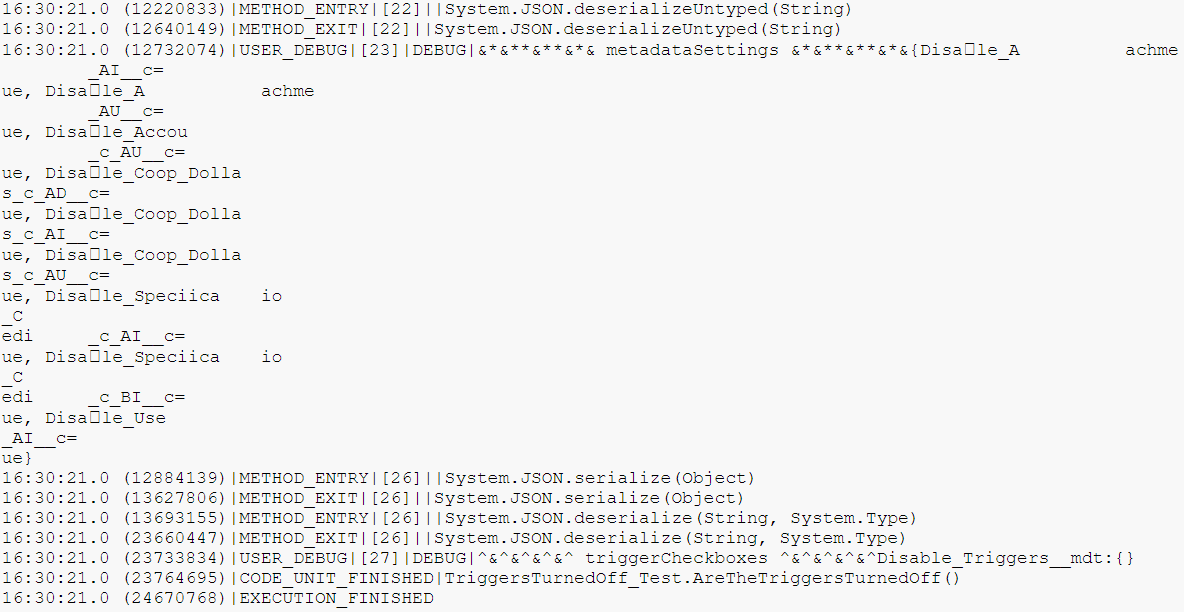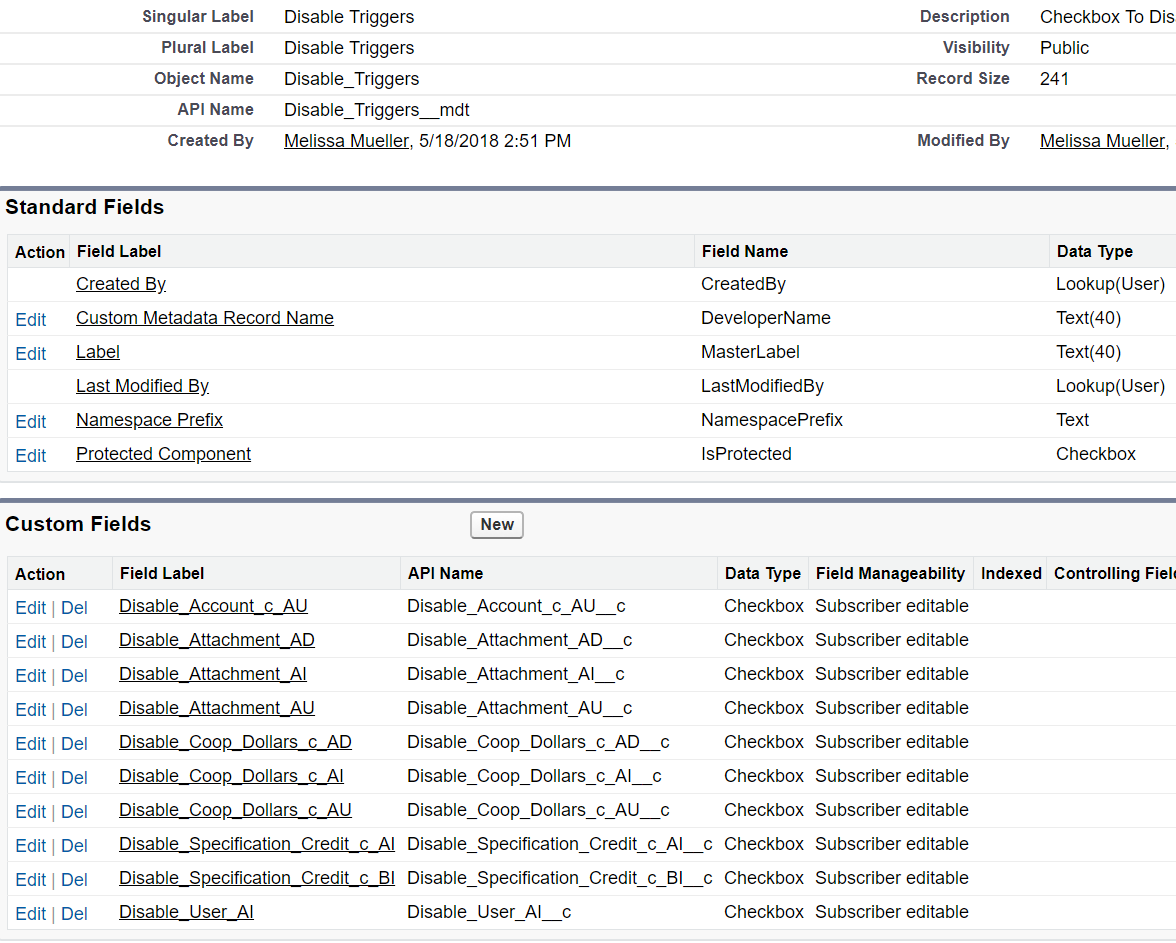I have a class that is called before the handler method of a trigger to check and see if a Custom Metadata Field is checked and therefore the code in the trigger handler should not be run. I can verify this works if you manually check the box in Manage Custom Metadata Settings, however I need to get increased coverage on it. Currently the tests for the trigger provide enough coverage to deploy, but barely enough. I need to be able to feed the value of true to the Custom Metadata within a test class. So, at Daniel Balinger's suggestion, I am attempting to do that using a mock call out as well as the JSON serialize/deserialize magic that was suggested by Patlatus and the expanded example from @andrew-fawcett here: Unit Test - Creating Custom Metadata I finally got the test to run without errors, but from the debug log and the lack of code coverage, I can tell it's not working correctly.
Here is my code; any help is appreciated, as I only did a Trailhead module that involved mock call outs a year and a half ago, and have never serialized/deserialized JSON.
The Static Resource:
{
"Disa\ble_Accou\n\t_c_AU__c": "\t\rue",
"Disa\ble_A\t\tachme\n\t_AI__c": "\t\rue",
"Disa\ble_A\t\tachme\n\t_AU__c": "\t\rue",
"Disa\ble_Coop_Dolla\rs_c_AD__c": "\t\rue",
"Disa\ble_Coop_Dolla\rs_c_AI__c": "\t\rue",
"Disa\ble_Coop_Dolla\rs_c_AU__c": "\t\rue",
"Disa\ble_Speci\fica\tio\n_C\redi\t_c_AI__c": "\t\rue",
"Disa\ble_Speci\fica\tio\n_C\redi\t_c_BI__c": "\t\rue",
"Disa\ble_Use\r_AI__c": "\t\rue"
}
The Calloout Class:
public class CalloutToStaticMetadataClass {
public static HttpResponse getCustomMetadata(String endpoint){
HttpRequest req = new HttpRequest();
req.setEndpoint(endpoint);
req.setMethod('GET');
Http h = new Http();
HttpResponse res = h.send(req);
return res;
}
}
The test:
@isTest
public class TriggersTurnedOff_Test {
@isTest
public static void AreTheTriggersTurnedOff(){
Map<String, Object> metadataSettings = new Map<String, Object>();
// Use StaticResourceCalloutMock built-in class to
// specify fake response and include response body
// in a static resource.
StaticResourceCalloutMock mock = new StaticResourceCalloutMock();
mock.setStaticResource('CustomMetadataStaticResource_Escaped');
mock.setStatusCode(200);
mock.setHeader('Content-Type', 'application/json');
// Set the mock callout mode
Test.setMock(HttpCalloutMock.class, mock);
// Call the method that performs the callout
HTTPResponse res = CalloutToStaticMetadataClass.getCustomMetadata('http://example.com/example/test');
if(res.getStatusCode() == 200){
// metadataSettings = (Map<String, String>) JSON.deserializeUntyped(res.getBody());
metadataSettings = (Map<String, Object>) JSON.deserializeUntyped(res.getBody());
System.debug('&*&**&**&*& metadataSettings &*&**&**&*&' + metadataSettings);
}
Disable_Triggers__mdt triggerCheckboxes = new Disable_Triggers__mdt();
triggerCheckboxes = (Disable_Triggers__mdt) JSON.deserialize(JSON.serialize(metadataSettings), Disable_Triggers__mdt.class);
System.debug('^&^&^&^&^ triggerCheckboxes ^&^&^&^&^' + triggerCheckboxes);
}
/*
public static void deserializeMetadata(){
Disable_Triggers__mdt triggerCheckboxes = new Disable_Triggers__mdt();
triggerCheckboxes = (Disable_Triggers__mdt) JSON.deserialize(JSON.serialize(metadataSettings), Disable_Triggers__mdt.class);
System.debug('^&^&^&^&^ triggerCheckboxes ^&^&^&^&^' + triggerCheckboxes);
}
*/
}
Trigger:
trigger AccountTrigger on Account (after update) {
String customMetadataField = 'Disable_Account_c_AU__c';
Schema.SObjectType accountType = Schema.Account.sObjectType;
accountType = Account.sObjectType;
Boolean enableHandler = AccountTriggerCheckDisabled.IsHandlerDisabled(accountType, customMetadataField);
if(enableHandler){
new AccountTriggerHandler().run();
}
}



AccountTriggerCheckDisabled.IsHandlerDisabled(..)from the test class. That way it doesn't matter what the CMDT is actually set to.